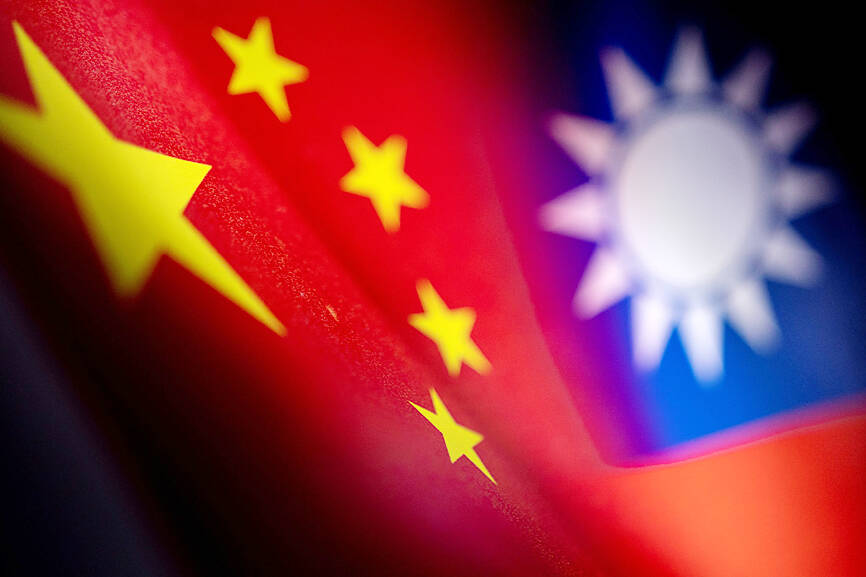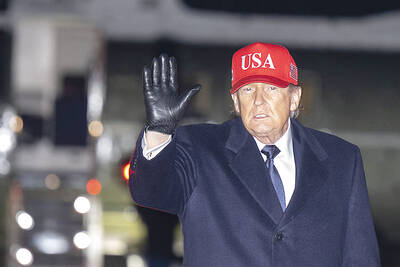A Democratic Progressive Party legislator yesterday introduced a draft amendment that would require Chinese spouses to swear an oath of loyalty to Taiwan and take a test of civic knowledge before becoming citizens.
Legislator Huang Jie (黃捷) proposed the changes amid controversy around a proposal to allow Chinese spouses to obtain citizenship after four years of marriage, down from six.
Under the proposal, the oath of loyalty would be legally binding, with contravention of it resulting in the person losing their household registration.

Photo: Reuters
Foreigners wishing to become citizens in most cases must forfeit their original citizenship and take a test, but there are legal and practical difficulties in asking Chinese immigrants to renounce their citizenship, Huang said.
Based on other countries’ citizenship laws, Huang’s proposal would add a naturalization oath and a test of language proficiency, citizens’ rights and obligations to the Act Governing Relations Between the People of the Taiwan Area and the Mainland Area (臺灣地區與大陸地區人民關係條例).
The oath would be performed publicly at a location and in a manner chosen by the Ministry of the Interior, the proposal says.
The text of the oath would read: “I completely renounce my former status as a citizen of the Mainland area and my basic rights and obligations herein. I also vow that after becoming a citizen of the Taiwan area, I will defend its democracy and freedom, abide by its Constitution and laws, and fulfill my civic obligations.”
The text would then be signed and stamped by the applicant, and sent to the ministry to be archived.
The citizenship test content, exemptions, fees and other matters would also be decided by the ministry, the proposal states.
Contravention of Article 33 or Article 33-1 of the act prohibiting engagement with certain organizations or people in China or contraventions of the Anti-infiltration Act (反滲透法) would result in the loss of household registration, which may be obtained after gaining citizenship.
Those with childcare or other obligations due to their status as citizens would be asked to leave the country, but their citizenship would not be forfeit, the draft states.

Taiwan has received more than US$70 million in royalties as of the end of last year from developing the F-16V jet as countries worldwide purchase or upgrade to this popular model, government and military officials said on Saturday. Taiwan funded the development of the F-16V jet and ended up the sole investor as other countries withdrew from the program. Now the F-16V is increasingly popular and countries must pay Taiwan a percentage in royalties when they purchase new F-16V aircraft or upgrade older F-16 models. The next five years are expected to be the peak for these royalties, with Taiwan potentially earning

STAY IN YOUR LANE: As the US and Israel attack Iran, the ministry has warned China not to overstep by including Taiwanese citizens in its evacuation orders The Ministry of Foreign Affairs (MOFA) yesterday rebuked a statement by China’s embassy in Israel that it would evacuate Taiwanese holders of Chinese travel documents from Israel amid the latter’s escalating conflict with Iran. Tensions have risen across the Middle East in the wake of US and Israeli airstrikes on Iran beginning Saturday. China subsequently issued an evacuation notice for its citizens. In a news release, the Chinese embassy in Israel said holders of “Taiwan compatriot permits (台胞證)” issued to Taiwanese nationals by Chinese authorities for travel to China — could register for evacuation to Egypt. In Taipei, the ministry yesterday said Taiwan

‘LIKE-MINDED PARTNER’: Tako van Popta said it would be inappropriate to delay signing the deal with Taiwan because of China, adding he would promote the issue Canadian senators have stressed Taiwan’s importance for international trade and expressed enthusiasm for ensuring the Taiwan-Canada trade cooperation framework agreement is implemented this year. Representative to Canada Harry Tseng (曾厚仁) in an interview with the Central News Agency (CNA) said he was increasingly uneasy about Ottawa’s delays in signing the agreement, especially as Ottawa has warmed toward Beijing. There are “no negotiations left. Not only [is it] initialed, we have three versions of the text ready: English, French and Mandarin,” Tseng said. “That tells you how close we are to the final signature.” Tseng said that he hoped Canadian Prime Minister Mark Carney

The US’ joint strikes with Israel on Iran dismantled a key pillar of China’s regional strategy, removing an important piece in Beijing’s potential Taiwan Strait scenario, said Zineb Riboua, a senior researcher at the Hudson Institute’s Center for Middle East Peace and Security. In an article titled: “The Iran Question Is All About China,” Riboua said that understanding the Iran issue in the context of China’s “grand strategy” is essential to fully grasp the complexity of the situation. Beijing has spent billions of dollars over the years turning Iran into a “structural strategic asset,” diverting US military resources in the